OMCL-AC240TS Replacement AFM Probes
OLYMPUS** Corp. have decided to stop producing their well-known AFM probes, also known as OLYMPUS** Micro Cantilevers, which have been on the market for a very long time.
For detailed information on how the different types of our AFM probes compare to the OLYMPUS** AFM probes please read our guide to OLYMPUS** Replacement AFM Probes.
Below is a list of AFM probes that can be used as replacements for the OLYMPUS** OMCL-AC240TS AFM probes with nominal resonance frequency 70kHz (range 50-90kHz) and nominal force constant 2N/m (range 0.6-3.5N/m), also known as AC240. This AFM probe type has a 240µm long AFM cantilever beam with a triangular end. The three-sided AFM tip is at the very end of that the AFM cantilever and has a 90° end flank.
The OPUS 240AC-NA is the perfect alternative to the AC240. In form, fit and function these AFM probes are duplicates. The AFM cantilever length as well as the mechanical properties are the same. The AFM cantilever shape as well as the AFM tip shape match. This AFM probe is also available without a reflective coating – 240AC-NN or with a gold reflective coating – 240AC-NG.
The OPUS 3XC-NA and 4XC-NN AFM multi-lever AFM probes both feature an AFM cantilever with the same mechanical properties and the same AFM tip shape as the AC240. The first model is available without a reflective coating – 3XC-NN.
The NANOSENSORS™ ATEC-FM features a three-sided protruding AFM tip at the end of the triangular AFM cantilever end that makes real tip visibility possible even when the AFM probe is mounted onto the AFM head and therefore tilted. The AFM cantilever length and overall shape are the same as with the OLYMPUS** AC240 AFM probe. From a mechanical parameter point of view the ATEC-FM has a slightly higher nominal resonance frequency and a stiffer AFM cantilever compared to the AC240. Due to the special AFM tip shape, the ATEC-FM AFM probes are not available with reflective coatings.
The NanoWorld® ARROW-FMR features a three-sided, slightly inclined AFM tip at the end of a triangular AFM cantilever end. The AFM cantilever length of the Arrow-FMR is identical to the AC240 from OLYMPUS** and the overall AFM cantilever shape is similar. The nominal resonance frequency is the same as the AC240 AFM probe and the stiffness is slightly higher compared to the AC240. With the Arrow-FM there is also a version without an aluminum reflective coating.
The NANOSENSORS™ PPP-FMR and NanoWorld® FMR AFM probes offer polygon-based Pointprobe® style AFM tips positioned several micrometers away from the free end of the AFM cantilevers. The AFM cantilevers feature an aluminum reflective coating. They have similar resonance frequencies to the AC240 and are slightly stiffer. Both the PPP-FMR and the FMR are optionally available uncoated or with a reflective gold coating.
The MikroMasch HQ:NSC18/Al BS and BudgetSensors Multi75Al-G AFM probes also offer similar resonance frequencies to the AC240 and slightly higher force constants. They are cost effective alternatives to the AC240 for soft tapping mode and force modulation mode measurements. The polygon-based rotated Pointprobe® style AFM tips (meaning the Pointprobe® style AFM tip is rotated by 180° on the AFM cantilever) are positioned some micrometers away from the free end of the AFM cantilevers. Uncoated and reflective gold coated versions are optionally available for each type.
Original OLYMPUS** AC240 AFM probes were sold by Bruker Corp. under different name - OLTESPA. For customers looking for the same order code and matching specifications we offer the OPUS OLTESPA.
For even more AFM probes for soft tapping mode please check the general AFM Probes Catalog category Force Modulation (FM) AFM Probes.
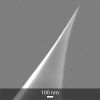

Tip Shape: Optimized Positioning


Tip Shape: Visible


Tip Shape: Standard
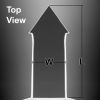

Tip Shape: Arrow


Tip Shape: Standard


Tip Shape: Rotated


Tip Shape: Rotated
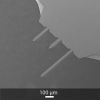

AFM Probe with 3 Different AFM Cantilevers for Various Applications and AFM Tips at the Very End of the AFM Cantilevers
Tip Shape: Optimized Positioning
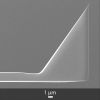

Tip Shape: Optimized Positioning


Tip Shape: Arrow


Tip Shape: Optimized Positioning
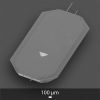

Tip Shape: Optimized Positioning








